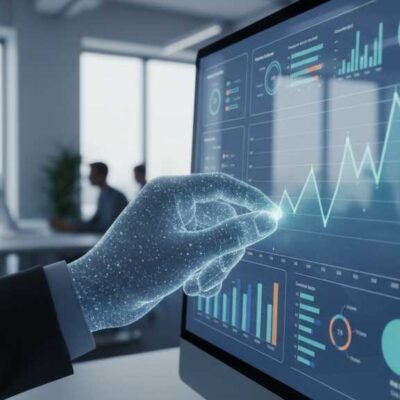Applications of Artificial Intelligence
Artificial Intelligence (AI) has permeated various sectors, becoming an essential component of modern technological advancements. From enhancing user experiences to optimizing complex processes, AI’s applications are extensive and transformative. Let’s explore some notable applications of AI that leverage the latest and most in-demand AI tools.
Natural Language Processing (NLP)
One of the most significant advancements in AI is its application in Natural Language Processing (NLP). NLP enables machines to understand, interpret, and respond to human languages in a way that is both meaningful and contextually appropriate. This technology powers a multitude of applications, including:
- Speech Recognition: Systems like Siri and Alexa utilize NLP to transcribe and comprehend spoken words.
- Machine Translation: Tools such as Google Translate use NLP algorithms to convert text or speech from one language to another.
- Sentiment Analysis: Businesses analyze customer feedback through sentiment analysis to gauge public opinion about products or services.
Computer Vision
AI techniques, particularly computer vision, allow computers to analyze and interpret visual data from the world. This capability has various applications:
- Facial Recognition: Security systems use AI to identify individuals based on their facial features, enhancing security measures.
- Medical Imaging: AI aids in analyzing medical images, facilitating early disease diagnosis and better treatment plans.
- Autonomous Vehicles: AI technologies help self-driving cars recognize obstacles, interpret traffic signals, and navigate roads safely.
Robotics and Automation
AI plays a transformative role in robotics and automation systems. Robots equipped with AI algorithms can:
- Perform Complex Tasks: In manufacturing and healthcare settings, AI-driven robots can adapt to dynamic environments and execute tasks with precision.
- Learn from Experience: These robots adapt based on previous tasks, continuously improving their efficiency and effectiveness.
- Collaborate with Humans: Many robots are designed to work alongside human teams, enhancing productivity across various sectors.
Recommendation Systems
AI-powered recommendation systems have reshaped customer experiences across industries such as e-commerce, media, and social networks. These systems analyze user data to suggest personalized content, including:
- E-Commerce: Online retailers utilize algorithms to recommend products based on a user’s prior purchases and browsing history.
- Streaming Services: Platforms like Netflix and Spotify tailor content suggestions by analyzing user preferences, enhancing viewer engagement and satisfaction.
Financial Services
In the finance sector, AI applications span a wide array of functionalities that enhance efficiency and security:
- Fraud Detection: Machine learning algorithms analyze financial transactions in real-time to flag suspicious activity and prevent fraud.
- Risk Assessment: AI tools evaluate credit scores and financial histories to offer personalized lending options.
- Algorithmic Trading: AI strategies analyze vast financial data to predict market trends and make informed trading decisions at lightning speed.
Healthcare Innovations
AI’s impact on healthcare is remarkable, revolutionizing patient care and operational efficiencies:
- Disease Diagnosis: AI systems assist healthcare professionals by analyzing patient data and medical histories, improving diagnostic accuracy.
- Drug Discovery: AI accelerates the drug development process by predicting how different compounds will affect various diseases.
- Patient Monitoring: Wearable devices equipped with AI track vital signs and alert medical professionals in case of anomalies.
Virtual Assistants and Chatbots
AI-driven virtual assistants and chatbots have become staples in customer service and support functions:
- User Interaction: These AI tools handle inquiries and provide information, improving customer satisfaction.
- Personalized Assistance: By learning from user interactions, AI chatbots can tailor responses and actions to better meet individual needs.
The Gaming Industry
AI’s potential extends into the gaming world, where it enhances user experience and engagement:
- Intelligent Game Characters: AI algorithms create realistic behaviors and decision-making processes for non-playable characters, enriching gameplay.
- Optimized Game Testing: AI can automate the testing process, identifying bugs and ensuring a smooth gaming experience for users.
Smart Home Systems
AI integration into smart home systems has transformed daily living by allowing automation of household tasks:
- Efficiency: AI-enabled devices can learn from user habits to optimize energy consumption and resource management.
- Voice Control: Users can control smart devices using natural language commands, making home management more intuitive.
Cybersecurity
As cyber threats become increasingly sophisticated, AI’s role in cybersecurity expands:
- Threat Detection: AI algorithms analyze network traffic to identify anomalies, significantly enhancing the capability to detect and counteract cyber threats.
- Automated Responses: AI can facilitate swift responses to security breaches, minimizing damage and improving recovery times.
Real-World Examples of AI Applications
AI is not just theoretical; its real-world applications showcase its transformative potential across various fields:
ChatGPT and Generative AI Tools
ChatGPT, along with other generative AI tools like Jasper AI and Copy.ai, is revolutionizing content creation. These models generate human-like text, streamlining tasks from customer service automation to creative writing in marketing and education. They’re also increasingly used in software development for generating code snippets and documentation.
Google Maps
Google Maps utilizes AI algorithms to enhance navigation and user experience. By analyzing real-time data, including traffic patterns and user feedback, it suggests optimal routes and provides timely updates about traffic conditions, making travel more efficient.
Self-Driving Cars
Self-driving vehicles, such as those found in Tesla’s Full Self-Driving (FSD) Beta program, rely on advanced AI for perception and decision-making. These systems interpret data from their surroundings to navigate safely and efficiently, making autonomous driving a promising reality for the future of transportation.
Streaming Services
Platforms like Netflix and Spotify effectively leverage AI to deliver personalized content recommendations. By analyzing user behavior, these services suggest movies and music tailored to individual preferences, significantly enhancing engagement and satisfaction.
With such diverse applications and ongoing advancements, AI is not only influencing current trends but also shaping the future landscape of technology across industries. The demand for expertise in AI continues to grow, indicating significant opportunities for professionals willing to harness its power.




